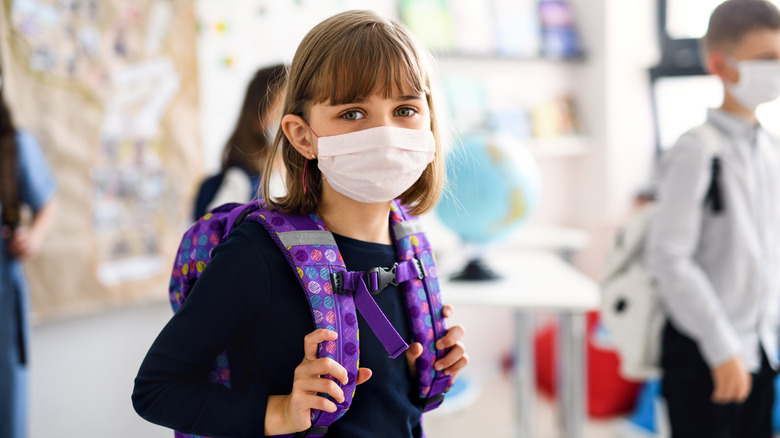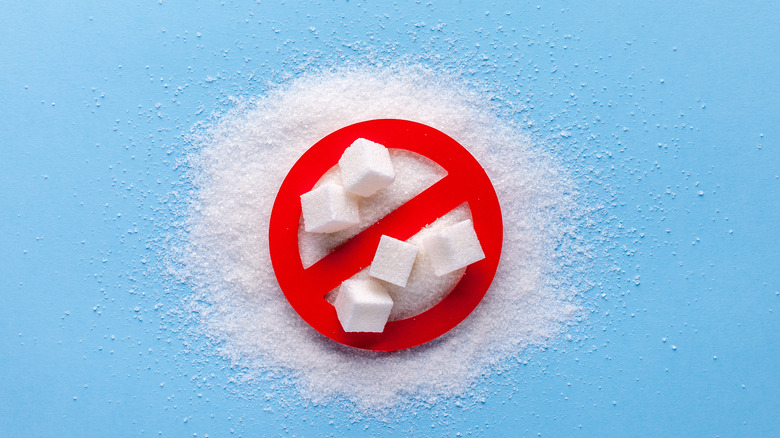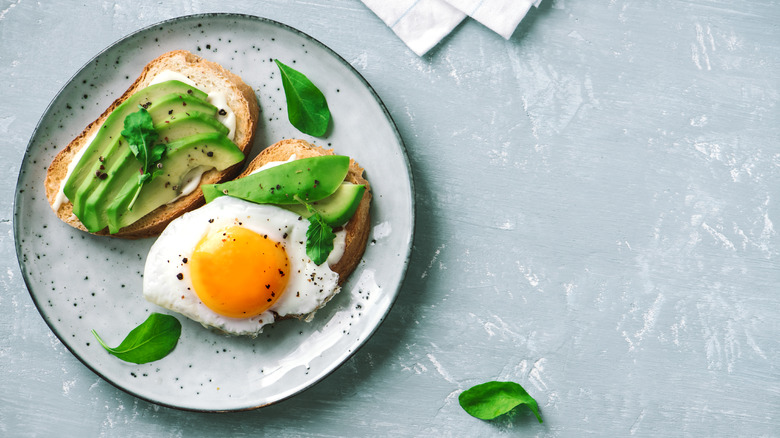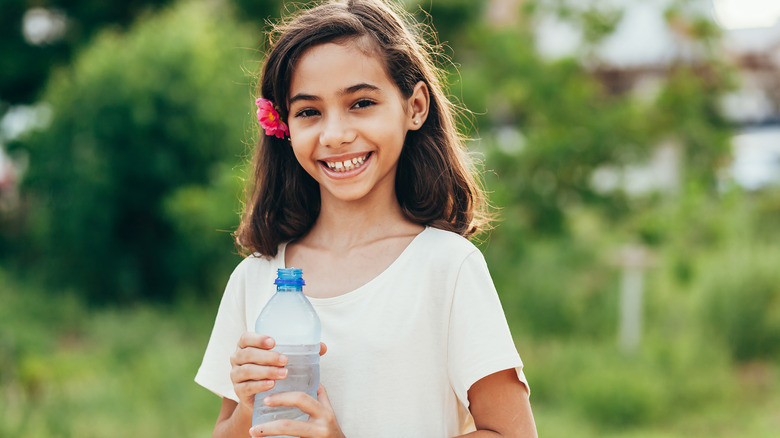Here's One Way To Help Protect Your Unvaccinated Kids From Covid-19
The COVID-19 vaccine rollouts are rolling right along, with Fox News reporting most states now offering the vaccine to anyone 16 and up. This is slim consolation, however, to parents of kids who won't reach that milestone anytime soon. During the early days of the pandemic, it was thought the virus only affected older people, but that proved not to be the case. In fact, as schools re-open, instances of the virus in under-18s are on a dramatic upswing. According to data published in the Philadelphia Inquirer, people younger than 19 made up roughly 3 percent of Montgomery County, Pennsylvania's COVID cases a year ago, while they now account for over 25 percent of all cases. In fact, pediatric COVID in that area has increased by more than 1500 percent in the past year.
No wonder school enrollment numbers were way down for the 2020/21 school year (via NPR)! Scary stuff, sending your kid out into a crowd when we don't even know if a kid-safe vaccine is on the horizon. Dr. Michael Goran, Ph.D., professor of pediatrics at the Children's Hospital of Los Angeles, feels that a vaccine for kids aged 12 to 15 "hopefully should be approved soon," but doesn't foresee under-12s getting vaccinated until 2022. He also points out that "If kids do get COVID, we don't yet really know the longer term consequences on growth and organ development." He did, however, share with The List his ideas on how to COVID-proof your kids as best you can.
Eliminating sugar may help boost virus immunity
In addition to being a pediatrics professor, Goran also authored a book called Sugarproof: The Hidden Dangers of Sugar That Are Putting Your Child's Health at Risk and What You Can Do, and it is his belief that excess sugar consumption underlies many of the health risks children face. He says that, since we can't (yet) vaccinate kids against COVID, the best thing we can do is to boost natural immunity, which is something that can be done by making changes to your kids' diets. "Sugary foods and processed foods," he tells us, "weaken the immune system and should be minimized." Instead, he recommends adopting "a more nutrient-dense and whole foods based approach" as something that can make for a more robust immune system. As to how sugar consumption affects COVID susceptibility, he cites studies showing that those with high blood glucose levels were more seriously impacted by the virus. Annals of Medicine (via Taylor & Francis Online) published the results of one such study of over 11,000 COVID patients in Spain.
While Goran says that eliminating all added sugar from your family's diet for an entire week and even purging your pantry of forbidden foods is "the most efficient and effective way to reduce sugar," he does have a number of other suggestions in case you prefer to approach your goal of reducing sugar consumption by taking less drastic steps.
Start off your day with a sugar-free breakfast
While breakfast may not actually be the most important meal of the day, it's still, as Goran tells us, "an important meal for kids, especially young kids," and he feels it's critical to cut down on the sweet stuff at this meal so kids can avoid what he calls "the daily sugar roller coaster." High-sugar breakfast items, he explains, cause energy bursts followed by crashes, neither of which are something your kids' teachers want to deal with.
Goran suggests switching breakfast cereal brands to something with less than 3 grams of added sugar per serving and suggests you supplement the standard bowl of cereal with some added fiber in the form of fruit or (should your kids be willing to accept these) flax or chia seeds. He says you should also make homemade pancakes or waffles instead of using store-bought ones, adding some extra fiber here, too, as well as maybe an egg white. Instead of using syrup, he proposes using plain yogurt, whipped cream, fruit compote, or coconut cream as a topping. Other healthy breakfast choices he endorses are steel-cut (as opposed to instant) oats and savory items like eggs and avocado toast (assuming there are any Gen Z/Gen Alpha kids who'd actually be into this millennial cliché).
Pack healthy lunches
When kids are stuck in a classroom for hours on end, the highlight of their school day is, of course, lunchtime. If you are able to pack your own lunches for them to take, this allows you the most input into (hopefully) having them make healthy eating choices. While you won't actually be there to make sure they don't beg cookies off a friend and/or toss their healthy kale/quinoa salad in the trash, you can try to figure out some acceptable lunchbox options that will strike the right balance between foods your kids might actually eat and foods Goran sees as being "nutrient dense."
Goran suggests using a compartmentalized bento box, preferably a stainless steel one. Fill a few of those compartments with plant-based snacks and sides – his suggestions include roasted red cabbage, spinach, and broccoli as these vegetables are all high in antioxidants. If you think there's a snowball's chance in the Sahara that your kiddo would actually eat any of these things, you could try crunchy dried chickpeas or sesame snacks instead, and fresh fruit is always a good bet. Goran says to steer clear of fruit snacks, though, calling these "candy in fruit colored shapes." As for the main dish, Goran endorses both tomatoes and turmeric for their anti-inflammatory properties. His ideas for using these include a turmeric stir fry and a caprese salad or sandwich.
Cut out sugary drinks
Kids, like adults, tend to drink a fairly high proportion of their calories in the form of sugar-sweetened beverages. Goran calls not only sodas and energy drinks but also fruit juice "liquid sugar," and warns that they provide this sugar in "concentrated and rapid form" so it hits the blood stream quickly. Such drinks tend to be high in fructose, something that he says is "rapidly metabolized by the liver in a process that produces reactive molecules that weaken the immune system."
Okay, so...not good. What should kids be drinking instead, though, if you take all these options off the table? Water, water, and more water, says Goran. His recommendation is to "make sure kids go to school with...a good insulated [water] bottle, preferably non-plastic or non BPA," although you should check with your kids' school and teachers to see whether classroom rules will allow this. Another suggestion that you shouldn't have any problem with involves keeping pitchers or bottles of water in the fridge at home and serving water at mealtimes. If this sounds really boring, Goran does allow enhancing your water with sliced fruit or frozen berries "for fun and flavor," and you may be relieved to know that sparkling water hydrates just as efficiently as the plain stuff.




